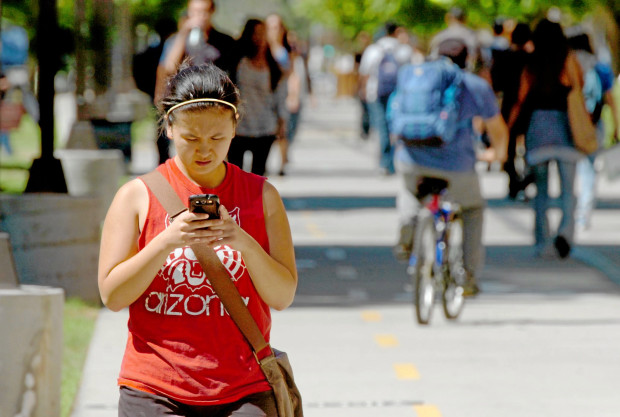Being addicted to technology has become a controversial part of our culture, affecting younger generations the most. Technological devices have altered the way people communicate, how they process emotions, their mental health, and their independence.
Students walk to class, slumped over with eyes glued to screens. One has drool hanging from her mouth and another has open sores on his thumbs from excessive scrolling. Their eyes are unblinking as they stare into their smartphones. They bump into each other but neither one of them notices. They both let out a distracted grunt and stagger on. These technology zombies live amongst us and more likely than not you are one of them.
According to Lauren Buchanan, a UI graduate student who studies interpersonal communication, the issue with today’s communication is accessibility. Since the smartphone and social media combo allows people to be in contact with anyone at any time, it can devalue the conversations that are had.
Losing value in connections often means they have taken a surface-level form, which can lead to a multitude of other issues. Feelings of isolation and depression have become prominent in college students, according to SDSU psychology professor, Jean Twenge.
Even though an illusion of a social life is accessible with the touch of a finger, it does not have the same effect as in-person experiences. Being invested in our devices takes away opportunities to form and nurture meaningful relationships. Samantha Jenson, a business major at Mesa College, says social media can be a nice distraction from the stressors of everyday life. However, when asked if using social media has ever made her feel depressed, lonely, or left out, she said yes.
FOMO, or the fear of missing out, is a term that refers to feelings of fear and anxiety as a result of not attending a social event. “I have felt FOMO from seeing posts on Snapchat and Instagram more times than I can count,” Jenson said.
While these feelings of missing out may be genuine, the social media posts Jenson was looking at might not be. When online, people can post the best version of themselves which includes exaggerating the fun time they’re having. Unplugging from technology can open your eyes to the wonderful things the real world has to offer, like connections to real people.
Having meaningful relationships can be an integral part of a person’s life. Without them, mental health can suffer. A study published by the Journal of Social and Clinical Psychology had 140 undergraduates either continue use of their devices or limit usage to 30 minutes per day for three weeks. As predicted, the students who reduced their screen time reported less feelings of anxiety, depression, and loneliness at the end of the three-week period.
The dependency people have on their devices allows feelings of discontent to flourish. For example, using it as a crutch for lulls in conversation can lead to lack of communication skills. Using it as a distraction from life’s challenges makes it harder to process emotions. In addition, always being attached to devices doesn’t leave space for alone time, which is essential in maintaining strong mental health.
On the edge of a new decade, it is easy to see how far technology has advanced. 19 years ago, there was no Facebook to keep us connected. When someone couldn’t be reached, leaving a message on their answering machine was standard. No one was tethered to each other; there was no sense of urgency to text back immediately or need to post a photo of avocado toast. There was freedom in being independent from devices. Before entering a new era, I encourage you to put away your phone as you walk to class and reflect on how being tethered to technology has affected you.


